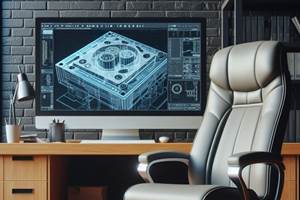Cardinal Alumni Say Soft Skills are Key for Success
Hearing from alumni of Eleva-Strum High School's Cardinal Manufacturing program, there's no doubt that learning soft skills were just as important as practical machining and welding skills.
The American Mold Builders Association hosted a plant tour on June 27 at a small company that we’ve all heard quite a lot about since it was launched seven years ago: Cardinal Manufacturing in Strum, Wisconsin. I finally made it out to see this student-run facility up close and was very impressed by the layout of the place, the equipment in it, and by the never-ceasing dedication of Craig Cegielski, instructor, founder and director of Cardinal. But I was especially enthralled by the students and alumni we met.
During the tour of Eleva-Strum School District’s Cardinal Manufacturing wing, AMBA members were given the opportunity to meet both current student employees and alumni. Let me tell you, these were very impressive youngsters. Current employees were busy and very focused on the tasks at hand. They were appropriately dressed, wearing eye protection and close-toed shoes. They looked and acted confident and more mature than most kids their age (in my experience). If I didn’t know they were working for a school-sponsored company to learn real-world skills, I’d have thought the operation was a small machine and welding shop start-up.
It was when we met five of the Cardinal alumni that I began to understand the effect participating in this program has on the students. For one, it gives them a reason to walk taller. Cardinal Manufacturing is geared to teaching, but it’s run like a business because it serves real customers from the region. Students learn, by doing, an array of skills, from marketing services to quoting jobs, ordering supplies, managing inventory, keeping books and invoicing, and so on. It’s not just about the actual production work. Every student has skin in the game, as they say, and being given that responsibility is empowering. “There’s no doubt that learning the soft skills was key to our getting a leg up on job opportunities after graduation,” said Tom Brazeau, who grew up on a farm, worked at Cardinal while in high school, attended technical college and today is looking to start his own machining company. He has already purchased his first CNC machine, and told AMBA members that Cardinal Manufacturing kept him in school. “You feel needed,” he said. “The freedom and trust that you’re given as part of the program really made me feel like I was part of something important.”
Cole Nichols agreed, saying he and his fellow Cardinal alumni have a kind of “celebrity status” in the eyes of current students. “We felt more peer pressure to go into the Cardinal Manufacturing program than to avoid it,” he explained. “You’re a rock star if you make the team because everybody wants do it.” Cole earned a mechanical engineering degree and said he had three job offers right out of college.
Dana Kensmoe, who was the only girl when she participated in the Cardinal program (someone commented that she could out-weld some of the guys), works as a welder now and said she’s the only woman welder where she’s employed. Tycon Rohrscheib attends the University of Wisconsin, Stout, and says because of his experience at Cardinal, he would like to become a technical education instructor. Last, but not least, is Austin Beyton, who, inspired by his time at Cardinal, works as a CNC machinist in Chippewa, Wisconsin.
The takeaway for me is the value of learning how being a team player, a good communicator, responsible, resourceful and creative, and all those other soft skills, and applying them to real life leads to positive futures. These alumni have proven that combining practical skills with those that nurture employability is the key to success.
If you read MMT, or our sister publication Modern Machine Shop, then you’ve heard the story of Cardinal Manufacturing. If the existence of this role model machining and welding shop run by students and Mr. Cegielski is news to you, just do a search on either of our magazines’ websites. I can assure you that you will come away quite inspired.
Related Content
Unique Mold Design Apprenticeship Using Untapped Resources
To help fill his mold design skills gap, Jeff Mertz of Anova Innovations, is focused on high schools and underprivileged school districts, a school that has lower graduation and college entrance rates. The goal is a student-run enterprise.
Read MoreHow to Improve Your Current Efficiency Rate
An alternative approach to taking on more EDM-intensive work when technology and personnel investment is not an option.
Read MoreMMT Chats: The Connection Between Additive Manufacturing Education and ROI
This MMT Chat continues the conversation with Action Mold and Machining, as two members of the Additive Manufacturing team dig a little deeper into AM education, AM’s return on investment and the facility and equipment requirements to implement AM properly.
Read MoreTackling a Mold Designer Shortage
Survey findings reveal a shortage of skilled mold designers and engineers in the moldmaking community, calling for intervention through educational programs and exploration of training alternatives while seeking input from those who have addressed the issue successfully.
Read MoreRead Next
Reasons to Use Fiber Lasers for Mold Cleaning
Fiber lasers offer a simplicity, speed, control and portability, minimizing mold cleaning risks.
Read MoreHow to Use Continuing Education to Remain Competitive in Moldmaking
Continued training helps moldmakers make tooling decisions and properly use the latest cutting tool to efficiently machine high-quality molds.
Read MoreHow to Use Strategic Planning Tools, Data to Manage the Human Side of Business
Q&A with Marion Wells, MMT EAB member and founder of Human Asset Management.
Read More
























